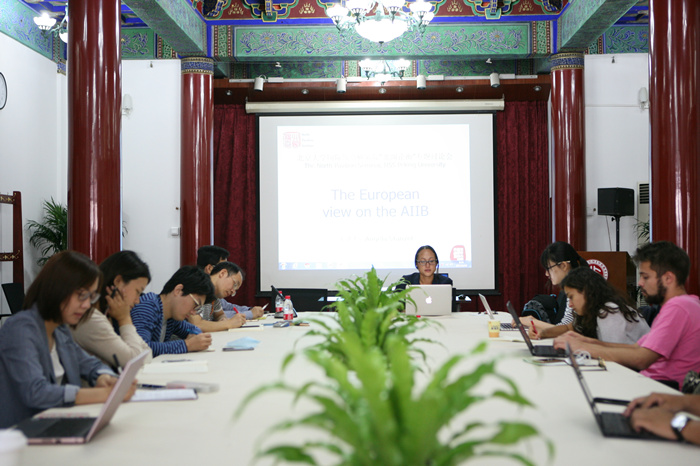
On September 20th, 2017, the Institute of International and Strategic Studies (IISS), Peking University (PKU) held the 17th session of “North Pavilion” series of lectures. Dr. Angela Stanzel, Asian Program Policy Research Fellow from the European Council on Foreign Relations (ECFR) was invited to deliver a special lecture on “Asian Infrastructure Investment Bank (AIIB) from the European Perspective”. This lecture was hosted by Associate Prof. Gui Yongtao, Assistant President of IISS.
Stanzel pointed out that from the viewpoint as a European, it was quite uncommon that China took the lead to establish AIIB. Initially, this news caused big uproar in Europe, as it was regarded as a challenge from China to the traditional global economic pattern dominated by western countries.
According to his observation, based on the current achievements, AIIB has exerted positive impact on European member countries. It has been proved by reality that, AIIB was not a multilateral development institution strongly dominated by China. With explicit, transparent and efficient process, AIIB can rival counterparts in developed countries in terms of working standard.
Stanzel also mentioned that there were 14 European countries in the 57 AIIB member nations. In the future, the success of AIIB would motivate more European countries to join. However, although European countries has truly benefited from AIIB, they are concerned of insufficient discourse power due to a small number of shares held by them.
He concluded that AIIB significantly demonstrated the improvement of China’s soft power. The establishment of AIIB was also regarded as a success in Europe, as European member countries truly felt they were equal partners rather than followers in AIIB.
At last, in the Q&A session, Stanzel discussed and communicated with scholars and students present on issues of interest such as the leader position of China in AIIB, the similarities of and differences between AIIB and World Bank (WB) as well as the development concept and prospect of AIIB.
(contributed by Liu Xingpei)

